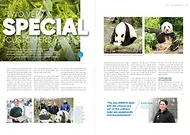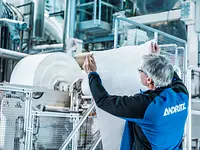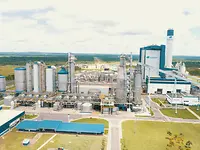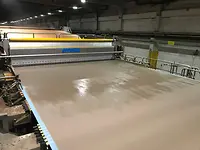Customer trials, research and development.
Two special customers
ANDRITZ received an unusual request: The world famous Schönbrunn Zoo in Vienna needed help to grate and process raw bamboo into refined flour for its giant pandas Yuan Yuan and Yang Yang. ANDRITZ, of course, accepted the challenge.
ANDRITZ thrives on the unusual at its R&D plants. At end of 2019, the Vienna Zoo contacted the Technology Department of the Paper, Fiber and Recycling Division about a very special project involving giant pandas. The request got the R&D team really excited; the task was to process 500 kg of bamboo into flour, which is the main ingredient used in the pandas’ steamed “bamboo bread”. The bread supplements the raw bamboo diet of 20-year old male giant panda Yuan Yuan and female Yang Yang. The roughly refined flour is particularly important for female pandas when they are rearing their young.


Giant pandas Yuan Yuan and Yang Yang in Vienna Zoo, Tiergarten Schönbrunn
Before contacting ANDRITZ, the zoo was grating and refining bamboo using a small, special device, which proved to be unable to handle the capacity demanded by the pandas. Giant pandas tend to eat a lot of the food they like, and the zoo was having trouble keeping up with the demand. The zoo urgently needed a solution. After the initial contact in January 2020, the zoo sent ANDRITZ 500 kg of pre-shredded bamboo. The shredded bamboo was sent to the Stock Preparation Pilot Plant in Graz where it was successfully processed using a CompaDis disperser. There was enough shredded bamboo to make one year’s supply of flour, which was then transported back to the zoo where it was frozen.
Dispersing is typically used in recycled fiber processes in order to detach the ink particles from fibers and disintegrate dirt particles and stickies below the visibility limit. With different fillings a disperser can also be used to refine almost all kind of fibrous materials, such as bamboo.
Laura Liukkonen, ANDRITZ Director of the pilot plant says, “In this case, the preshredded material was refined with a CompaDis disperser between the edges of the “tooth type” fillings. Since refining bamboo was a novel process for the Stock Preparation Pilot Plant, the first task was to find the right process parameters to reach the targeted quality. After dispersing, the green flour was fed into big bags and sent to Vienna Zoo. Due to the nutritional end use, it was our highest priority to avoid any contact with other materials.”

Dr. Eveline Dungl, Zoo Curator and Animal Trainer; Laura Hinterndorfer, Animal Keeper; Kiva Prinsloo, Animal Keeper; and Denis Jozic, Process and Technology, ANDRITZ Paper, Fiber and Recycling Division
FULL-LINE CAPABILITES FOR TESTING
The Stock Preparation Pilot Plant in Graz was the perfect place in which to find the much-needed solution for the pandas’ dietary requirements. As part of its everyday existence, the plant tests and processes all types of raw material to fulfill the needs of customers, including the very special ones like the giant pandas. The mindset at the plant is very much based on the one of trial and error, enabling customers to take the opportunity to experiment with potential raw materials, while allowing their mills to do what they do best: run at maximum uptime and efficiency.
The pilot plant has the full range of equipment for customer trials and experiments for process R&D, and is flexible enough to accommodate single machine testing or complete process lines. It is able to process both virgin and recycled fibers and has the ability to collaborate with experts from around the world including other technical centers, located in Foshan, China and Springfield, USA.

At the Stock Preparation Pilot Plant in Graz, papermakers have the possibility to test their ideas on a pilot scale and simulate paper mill conditions – regardless of whether a certain single piece of equipment or a complete line in different setups is being tested.















